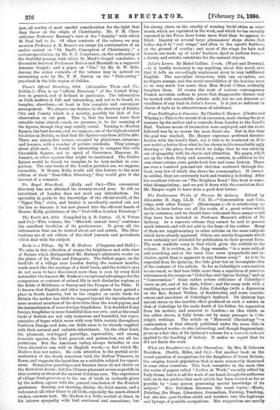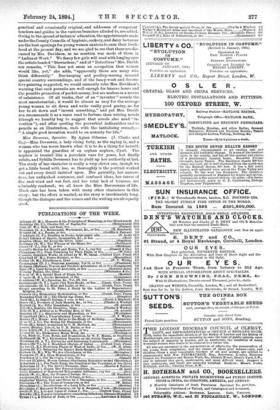What our Daughters can do for Themselves. By Mrs. H.
Coleman Davidson. (Smith, Elder, and Co.)—Yet another book on the vexed question of occupations for the daughters of Great Britain, the surplus female population that is more summarily dismissed in some other countries. This book resembles in the main idea. the series of papers called " Ladies at Work," recently edited by Lady Jenne, but it is all the work of one hand, though the authoress tells us in her preface that each article has been revised as far as possible by " some person possessing special knowledge of its subject." Mrs. Davidson discusses the usual topics,—Music, Painting, the Stage, Literature, Journalism, Nursing, Teaching, but she also goes further afield and wanders into the highways and byways of possible occupations. Her suggestions are mostly practical and occasionally original, and addresses of competent teachers and guides in the various branches alluded to, are added. Owing to the spread of technical education, the appointments made under the County Councils of hygienic,cookery,and dairy lecturers are the best openings for young women anxious to earn their liveli- hood at the present day, and we are glad to see that these are dis- cussed by Mrs. Davidson, as no mention was made of them in " Ladies at Work." We fancy few girls will read with longing eyes the article headed " Stewardess ;" and of "Detectives" Mrs. David- son remarks, " This does not seem an occupation that women would like, yet," she adds, "apparently there are many who think differently." Bee-keeping and poultry-rearing demand special country surroundings, and of the fancy-work and decora- tive painting suggested, we would earnestly echo Mrs. Davidson's warning that such pursuits are well enough for leisure hours and the possible promotion of pocket-money, but are useless as a means of subsistence. Of all trades, that of an " inventor" sounds the most unsubstantial; it would be almost as easy for the average young woman to sit down and write really good poetry, as for her to sit down and "invent something," and yet Mrs. David- son recommends it as a surer road to fortune than writing novels (though we humbly beg to suggest that novels also need " in- vention "), and after quoting the proverbial indiarubber end to pencils as an illustration, ends with the tantalising remark,- " A single good invention would be an annuity for life."



































 Previous page
Previous page